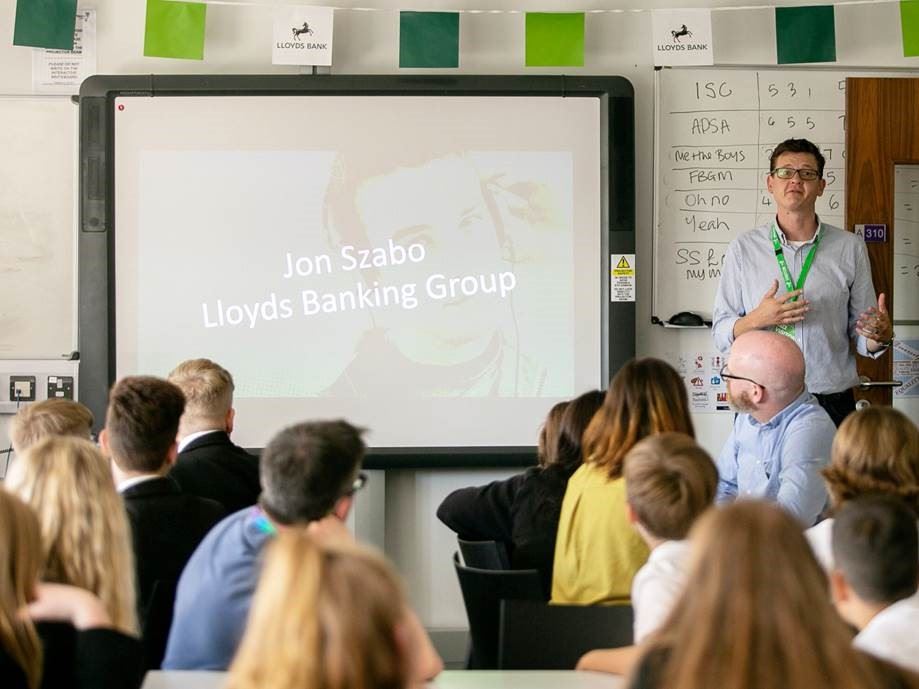Engaging with Employers
Many employers are passionate about their industry sectors and are keen to engage with schools and colleges - as they are the source of their future employees. However, it takes time to build employer relationships and these must be nurtured carefully so that your students and your business contacts benefit.
Find out more about building lasting links with employers:
BUILDING EMPLOYER LINKS
PROVIDING A GOOD EXPERIENCE
TYPES OF ENGAGEMENT
Building employer links
Cold-calling is time consuming and may not be well-received by local businesses. Fortunately, schools benefit from a ready-made employer network through students’ parents. You could use existing school communication channels, such as newsletters or emails, to identify parents willing to commit to careers activity activities.
The school careers lead or coordinator could be present at parents evening to discuss careers with students and parents and to discover potential contributors to activities. Wider local networks, including local business groups and Chambers of Commerce are a great way to meet the local business community. You can research local groups online and are likely to find a warm welcome.
Whilst some employers may immediately commit to supporting careers activities it usually takes time to build trust and confidence. It is helpful to consider the type and size of the business and find activities that are a good fit for the employer. Larger businesses may be better resourced to host work experience and placements, whilst smaller businesses may prefer less intense engagement such as contributing to an assembly or speaking to a form group.
Key things to consider when developing employer links:
- Will the engagement opportunity meet a need for the business as well as the school? (e.g. increased local profile, increased awareness of future recruits)
- For workplace visits, including work experience placements - is the environment appropriate for a visit, are there realistic tasks for a student?
- Is the employer able to provide brief input, or might they want to develop a longer term relationship with a subject area linked to their industry sector?
Providing a good experience
Once an employer has committed to careers activities at your school it is vitally important that they have a good experience, if you wish them to continue contributing. The key issues to address are:
THE BRIEF
Ensure your employer knows:
- how many students they will engage with and their year group and age
- the purpose of the engagement e.g. inspirational talk, mock interview, business challenge
- any advance preparation they should have made
- when the activity will take place and how long it will last
ARRIVAL AND WELCOME
Be clear about:
- how to find the school and, if driving, where to park
- where to report upon arrival. If this will be at reception, ensure the receptionist is aware
- ideally the employer will have a direct telephone number for a named person in case they have any last-minute problems
RETAINING EMPLOYER SUPPORT
It is vital to thank employers for their contribution after the event. You should also ask the employer for any feedback and improvements that might be made. Holding an annual gathering for your employers, such as a business breakfast or evening networking event will also demonstrate that you value them.
Types of engagement
Students can benefit from many types of employer engagement. Some of the most popular activities are outlined below:
INSPIRATIONAL MESSAGE
Typically, these are delivered during form group time, during an assembly or in a subject group. They are suitable for any year group. A session may last 30 minutes to an hour and may include:
- an inspirational talk about an industry sector, with some key information on who is likely to enjoy a career in that field, the skills they will need and the subjects to consider
- question and answer time
- if time and resources allow, a demonstration of the product, service or skill involved – or a relevant scenario for the students to address
MOCK INTERVIEWS
These often take place in years’ 10 and 11 as students prepare for interviews with employers or further education.You will need to consider:
- an appropriate space – so that the interviews are not disrupted by other activities.
- employer availability – can you structure the event so that employers can attend for specific periods rather than a whole day?
The interview may be based on real jobs supplied by participating employers. In this case, you should give the students the job descriptions in advance so they can research the company and prepare for the interview. Each employer can then select their winning candidate.
Alternatively, you may wish to set standard questions for all employers and candidates. These questions should help the students to identify their skills and articulate them to an employer. Examples include:
- When have you demonstrated team-work skills? Students could outline how they have taken part in group projects at school or been part of a sports team, drama group or similar
- When have you demonstrated leadership ability? This could relate to the activities above, or within a family or friendship group where the young person has needed to step forward
BUSINESS CHALLENGES
These challenges help young people to understand business skills including planning, budgeting and marketing. Charities, such as Young Enterprise and NCS Trust offer business challenge formats or you may devise your own.
If devising your own, you will need to consider the brief for the students. This might relate to a subject area e.g. creating a new dessert in food technology or planning a housing development in geography. Alternatively, you might provide a wider choice such as: ‘devise a new product or service and plan how you will bring this successfully to market’. The challenge could take place in one condensed school day, or in shorter sessions over a longer period. Students work in small groups to tackle the challenge.
Employers assist the students during the challenge, by asking key questions about planning, budgeting etc. The employers also then judge the entries and choose their winner.
WORKPLACE VISITS
These are great opportunities for students to see the reality of a workplace. Visits work best when small groups of students with clear interest in an industry attend. Before the visits students should research the company and think of any questions they would like to ask on the day.
The business will need to host the visit safely and effectively. A visit might include:.jpg)
- an engaging overview of the business from a senior colleague
- a student activity relevant to the business
- a meeting with a younger staff member – emphasising the reality of opportunities at the business
WORK EXPERIENCE
Work experience should be carefully planned so that the young person and business benefit. Students aged 14+ can take part in work experience and are considered employees of the company. If the employer currently has no young employees, they should consider reviewing their risk assessment in relation to young people. The student should undertake meaningful and achievable tasks with appropriate supervision, which allows business to continue.
Don't forget to subscribe to our Education Newsletter for details of resources, information and events on careers related activities in Somerset.
